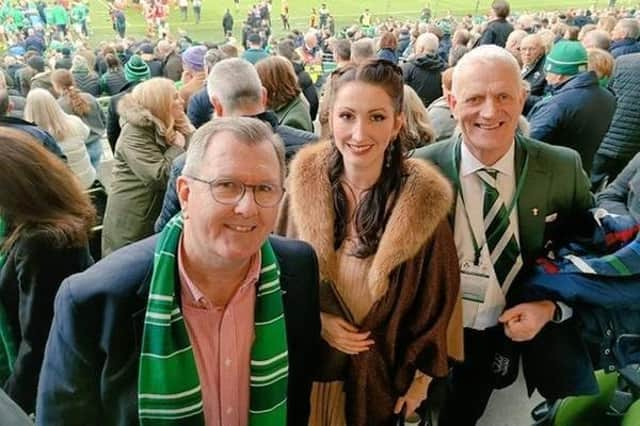Neil McCarthy: The DUP embrace of Irish unionism is bad news for nationalists


Sir Jeffrey Donaldson’s position, extremely precarious at the beginning of the year, is now more secure than anyone could have predicted; the position of his detractors (in his own party, the TUV and assorted ranks of Brysonistas) correspondingly weaker.
Not only has he successfully tacked back to the initial position on the Irish Sea border which his party took under Arlene Foster took, of seeing the opportunities in it and saying there was no constitutional significance, but he has also attached this bold volte-face to a new unionism.
Advertisement
Hide AdAdvertisement
Hide AdMrs Foster said on Christmas Eve 2020, just before the Northern Ireland Protocol kicked in, that it was a “new era in the relationship between the UK and the EU” in which the people of Northern Ireland would want to “maximise the opportunities the new arrangements provide for our local economy”.
A unionism which, in a bid to convert newcomers, will look outside its traditional support base.
The DUP has been here before.
Peter Robinson’s 2004 speech about Gaels and Planters having an equal stake in Northern Ireland springs to mind.
What is striking is that leading lights in the party are now doing more than just making visits to milieus associated with Irishness and/or Irish nationalism, as unionists have done in the past (think of Arlene Foster’s visit to Clones to watch the Ulster Gaelic Football final).
They are now staking their own claim upon Irish identity.
Advertisement
Hide AdAdvertisement
Hide AdWhen Emma Little-Pengelly and her party leader Sir Jeffrey went down to Dublin last month to cheer on Ireland against Wales in rugby, the deputy first minister issued a statement in which she talked about “our incredibly rich heritage – proud Anglo-Irish and Ulster Scots – and our role in the very fabric of our isle, we are the people of JB Yeats, Beckett, Oscar Wilde, Iris Murdoch, Lavery, of Jameson’s and Guinness… and much more!”
Likewise, when the DUP education minister Paul Givan visited a Gaelscoil in Tyrone a couple of weeks later, he did not talk about the Irish language as something of particular importance to the nationalist community, but rather as something of importance to all the people of Northern Ireland.
Presbyterians, he observed, had played a crucial role in conserving the language in centuries past.
Mr Givan was dancing – he literally danced to a jig - to a tune favoured by the late Dr Paisley, who believed in an ‘Irish unionism’.
Advertisement
Hide AdAdvertisement
Hide AdThis is all a very long way from the not-too-distant past when not a single unionist attended Seamus Heaney’s funeral in 2014; or the time, years ago, when unionists in Armagh objected to a memorial to the writer George Moore, who died decades earlier, because it referred to him as an ‘Irish’ writer.
Arlene Foster did not make such claims upon Irishness when she visited Clones – she said she was going because the sport meant a lot to nationalists and so she was showing respect for the other tradition. Now her successors are going a step further and actually embracing aspects of Irishness.
The acceptance of the ‘best of both worlds’ economic case for the Protocol/Windsor Framework is therefore now inextricably bound up with a DUP-led unionism which explicitly recognises Northern Ireland as a shared society, comprising both British and Irish strands.
In claiming both British and Irish identity the DUP is hacking away at a core nationalist objection to the existence of Northern Ireland – that it is a political entity incapable of recognising Irishness.
Advertisement
Hide AdAdvertisement
Hide AdThe confidence and brio with which the DUP are staking out this new territory is potentially very bad news for naysayers such as Bryson and Jim Allister.
Perhaps more significantly, it is very bad news for nationalism.
The Sinn Fein president Mary Lou McDonald recently ruled out an ongoing role for Stormont in the event of a united Ireland, which showed she had no room for concessions to a separate Northern Ireland identity, despite her occasionally generous rhetoric, such as saying in America recently that she offered as much to people from the Shankill as from the Falls.
How likely is it that Sinn Féin and the SDLP will see fit to sell voters a united Ireland which honours equally both Irish and British identities?
Advertisement
Hide AdAdvertisement
Hide AdOpinion polling in the south has shown that, in the unlikely event that they were to adopt such a position, it would be resoundingly rejected. In poll after poll, the Irish public has shown to be hostile even to cosmetic changes to the symbols of Irish nationhood.
There is much cant in Irish nationalist discourse about the symbolic meaning of the Irish Tricolour.
How ironic that the DUP could now claim this flag as more appropriate for the New Northern Ireland.
Of the two Irish states, Northern Ireland is now the one which genuinely celebrates and cherishes ‘all the children of the nation’ equally.
Neil McCarthy is a writer and teacher based in Dublin and London